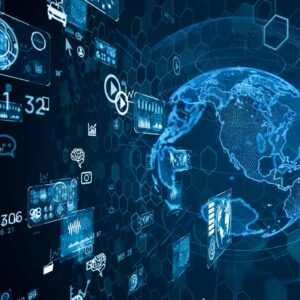Introduction
The rapid advancement of technology is reshaping the job market, influencing how we work, the types of jobs available, and the skills required to succeed. From automation and artificial intelligence (AI) to the proliferation of digital platforms, technology is driving significant changes across industries. This blog delves into the impact of technology on future jobs, offering insights on how to navigate this evolving landscape.
The Current Technological Landscape

Automation and AI
Automation and AI are at the forefront of technological innovation. Machines and algorithms are increasingly performing tasks that were once the sole domain of humans. This trend is prevalent in manufacturing, where robotic systems enhance efficiency and precision, and in service sectors, where AI-driven chatbots and virtual assistants improve customer interactions.
- Manufacturing Revolution
- Automation has revolutionized the manufacturing industry. Advanced robotics and AI systems can perform tasks with a level of precision and efficiency that surpasses human capabilities. This includes everything from assembling parts to quality control, reducing errors, and increasing productivity.
- Service Industry Transformation
- In the service industry, AI is being used to enhance customer service experiences. AI-driven chatbots can handle customer inquiries, process transactions, and provide personalized recommendations, improving customer satisfaction and reducing the need for human intervention in routine tasks.
Digital Transformation

Digital transformation is the integration of digital technologies into all areas of business, fundamentally changing how organizations operate and deliver value to customers. This includes the adoption of cloud computing, big data analytics, and the Internet of Things (IoT), which enable businesses to operate more efficiently and make data-driven decisions.
- Cloud Computing
- Cloud computing allows businesses to store and access data and applications over the internet, providing flexibility and scalability. It enables remote work, supports big data analytics, and reduces the need for physical infrastructure.
- Big Data Analytics
- Big data analytics involves examining large and varied data sets to uncover hidden patterns, correlations, and insights. Businesses use these insights to make informed decisions, improve operations, and predict future trends.
- Internet of Things (IoT)
- The IoT connects devices over the internet, allowing them to communicate and share data. This technology is transforming industries like healthcare, agriculture, and logistics by improving efficiency and enabling new services.
Remote Work and Digital Collaboration

The COVID-19 pandemic accelerated the shift towards remote work, highlighting the importance of digital collaboration tools. Platforms like Zoom, Microsoft Teams, and Slack have become essential, enabling teams to communicate and collaborate effectively from different locations. This trend is likely to continue, with remote and hybrid work models becoming more commonplace.
- Remote Work Models
- Remote work models provide flexibility for employees and can lead to increased productivity. Companies are adopting hybrid models, combining remote work with in-office days to balance flexibility and collaboration.
- Digital Collaboration Tools
- Tools like Zoom, Microsoft Teams, and Slack facilitate communication and collaboration among remote teams. They offer features such as video conferencing, file sharing, and project management, making it easier for teams to stay connected and productive.
Impact of Technology on Future Jobs

Job Displacement and Creation
- Displacement of Routine Jobs
- Routine and repetitive tasks are increasingly being automated. Jobs in sectors such as manufacturing, retail, and even some areas of finance are at risk of being displaced by machines and AI. For example, self-checkout machines in retail stores reduce the need for cashiers, and automated accounting software reduces the need for manual bookkeeping.
- Creation of New Jobs
- While automation may eliminate certain jobs, it also creates new opportunities. Roles in tech development, cybersecurity, data analysis, and AI ethics are emerging. For instance, the rise of AI has led to demand for AI specialists, data scientists, and machine learning engineers. Additionally, new industries such as renewable energy and biotechnology are creating jobs that require advanced technical skills.
Changing Skill Requirements
- Technical Skills
- Proficiency in digital tools and technologies is becoming essential. Skills in programming, data analysis, cybersecurity, and AI are highly valued. Educational institutions are adapting their curricula to prepare students for these demands.
- Soft Skills
- As technology handles more routine tasks, human skills like critical thinking, creativity, emotional intelligence, and problem-solving become increasingly important. Jobs that require these skills are less likely to be automated. For example, roles in leadership, innovation, and customer service will continue to rely heavily on these human attributes.
- Continuous Learning
- The rapid pace of technological change necessitates continuous learning and skill development. Professionals must stay updated with the latest trends and technologies to remain competitive in the job market. This includes pursuing certifications, attending workshops, and engaging in online learning platforms.
Gig Economy and Freelancing

Technology has facilitated the growth of the gig economy, where short-term, flexible jobs are commonplace. Platforms like Upwork, Fiverr, and Uber allow individuals to offer their services on a freelance basis. This trend offers both opportunities and challenges, such as income instability and the need for self-management skills.
- Flexibility and Autonomy
- The gig economy offers flexibility and autonomy for workers, allowing them to choose projects that align with their skills and interests. This model can lead to increased job satisfaction and work-life balance.
- Challenges and Considerations
- However, gig workers often face challenges such as income instability, lack of benefits, and the need for self-management. It is crucial for individuals to develop strong time management and financial planning skills to navigate these challenges effectively.
Industry-Specific Impacts

Healthcare
- Telemedicine
- Technology enables remote diagnosis and treatment, expanding access to healthcare services. Telemedicine platforms are becoming more sophisticated, incorporating AI for diagnostics and patient monitoring. This allows healthcare providers to reach patients in remote areas and offer timely care.
- Medical Research and Personalized Medicine
- Big data and AI are transforming medical research, enabling personalized medicine tailored to individual genetic profiles. This requires healthcare professionals to have a deeper understanding of data analytics and bioinformatics. For example, AI algorithms can analyze genetic data to predict an individual’s risk of certain diseases and recommend personalized treatment plans.
- Healthcare Automation
- Automation in healthcare can streamline administrative tasks, allowing healthcare providers to focus more on patient care. Technologies like electronic health records (EHR) systems, automated appointment scheduling, and AI-driven diagnostic tools are becoming integral to healthcare operations.
Education
- E-Learning and Online Education
- Digital platforms have revolutionized education, offering online courses and degrees. This trend democratizes access to education but also requires educators to adapt to new teaching methods and technologies. E-learning platforms like Coursera, edX, and Khan Academy provide high-quality education to students worldwide.
- Lifelong Learning
- The fast pace of technological change necessitates continuous learning. Workers must regularly update their skills to stay relevant, leading to an increase in demand for lifelong learning programs and micro-credentials. Institutions are offering short-term courses and certifications that cater to professionals seeking to upgrade their skills.
- Educational Technology (EdTech)
- EdTech tools, such as virtual classrooms, interactive learning apps, and AI-driven tutoring systems, are enhancing the learning experience. These technologies offer personalized learning paths, real-time feedback, and greater engagement for students.
Finance
- Fintech Innovations
- Blockchain, digital currencies, and AI-driven financial services are transforming the finance sector. Professionals in finance need to adapt to these technologies and understand their implications. For example, blockchain technology is revolutionizing the way transactions are conducted, offering greater transparency and security.
- Regulatory Technology (RegTech)
- Technology is also being used to ensure compliance with regulations, reducing the burden on financial institutions. This creates demand for specialists who understand both finance and regulatory environments. RegTech solutions help financial institutions monitor transactions, detect fraud, and ensure compliance with legal standards.
- Digital Banking
- The rise of digital banking and mobile payment solutions is changing how consumers manage their finances. Banks are investing in digital platforms that offer seamless, user-friendly experiences for customers, driving the need for professionals skilled in digital banking technologies.
Preparing for the Future

Education and Training
- Adapting Curricula
- Educational institutions must adapt their curricula to focus on the skills needed for future jobs. This includes offering courses in emerging technologies and fostering an environment that encourages innovation and critical thinking. For example, integrating coding and data science courses into standard curricula can prepare students for tech-driven careers.
- Industry Partnerships
- Collaborations between educational institutions and industries can help bridge the gap between academic learning and practical skills. Internships, apprenticeships, and industry-led projects provide valuable experience. Such partnerships ensure that students gain hands-on experience and understand real-world applications of their knowledge.
- Continuous Professional Development
- Educational institutions should also offer continuous professional development programs for working professionals. These programs can help individuals stay updated with industry trends and advancements, ensuring they remain competitive in the job market.
Government and Policy
- Supporting Transition
- Governments need to support workers transitioning from displaced jobs to new opportunities. This can be achieved through reskilling programs, unemployment benefits, and incentives for businesses to hire and train workers. Public policies should focus on creating a supportive ecosystem for lifelong learning and workforce development.
- Regulating Technology
- As technology evolves, appropriate regulations are needed to address ethical concerns, data privacy, and cybersecurity. Policymakers must stay informed about technological advancements to create effective regulations. This includes setting standards for AI ethics, data protection, and cybersecurity practices.
- Promoting Inclusive Growth
- Governments should also focus on promoting inclusive growth, ensuring that technological advancements benefit all segments of society. This includes investing in digital infrastructure, promoting digital literacy, and addressing the digital divide to ensure equal access to opportunities.
Individual Responsibility
- Embracing Lifelong Learning
- Individuals must take responsibility for their own learning and career development. This includes staying informed about industry trends, seeking out new learning opportunities, and being open to change. Lifelong learning is crucial in adapting to the evolving job market and staying competitive.
- Developing a Growth Mindset
- A growth mindset, which involves viewing challenges as opportunities for growth, is crucial. This mindset encourages resilience and adaptability in the face of technological changes. Embracing a growth mindset allows individuals to continuously improve their skills and stay relevant in their careers.
- Networking and Professional Growth
- Building a strong professional network is essential for career growth. Networking allows individuals to stay connected with industry peers, gain insights into job opportunities, and share knowledge. Attending industry conferences, participating in online forums, and joining professional associations can enhance networking opportunities.
Conclusion
The impact of technology on future jobs is profound and multifaceted. While it presents challenges, such as job displacement and the need for new skills, it also offers significant opportunities for growth and innovation. By understanding these changes and proactively preparing, individuals, educational institutions, and policymakers can navigate this evolving landscape successfully. The College Forum is the best platform to explore the best colleges in Dehradun, offering programs that equip students with the skills needed to thrive in the future job market. Through comprehensive education, continuous learning, and a supportive policy environment, we can ensure that the workforce is well-prepared for the technological advancements shaping the future.

